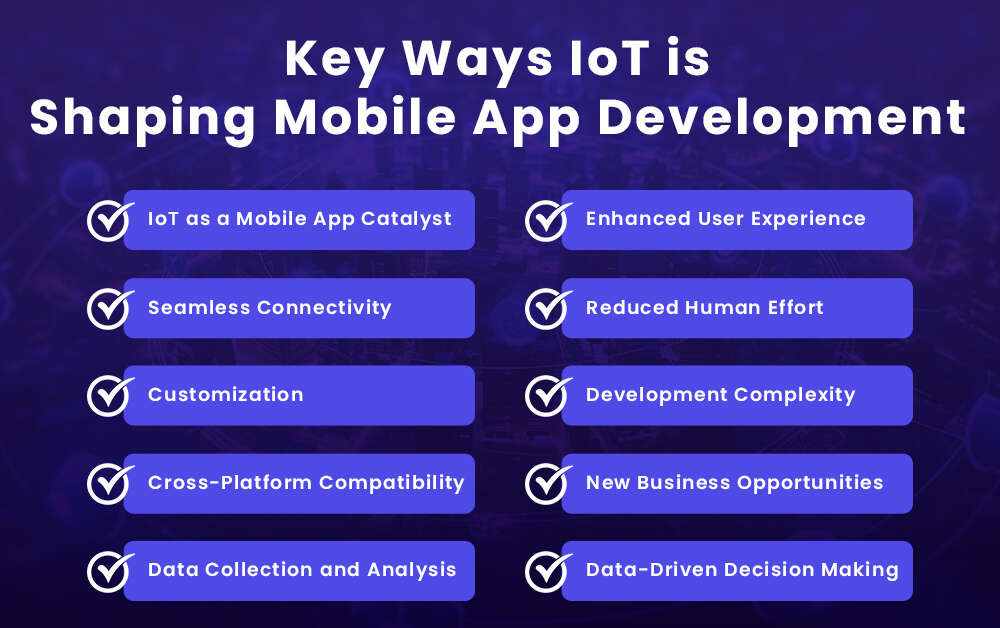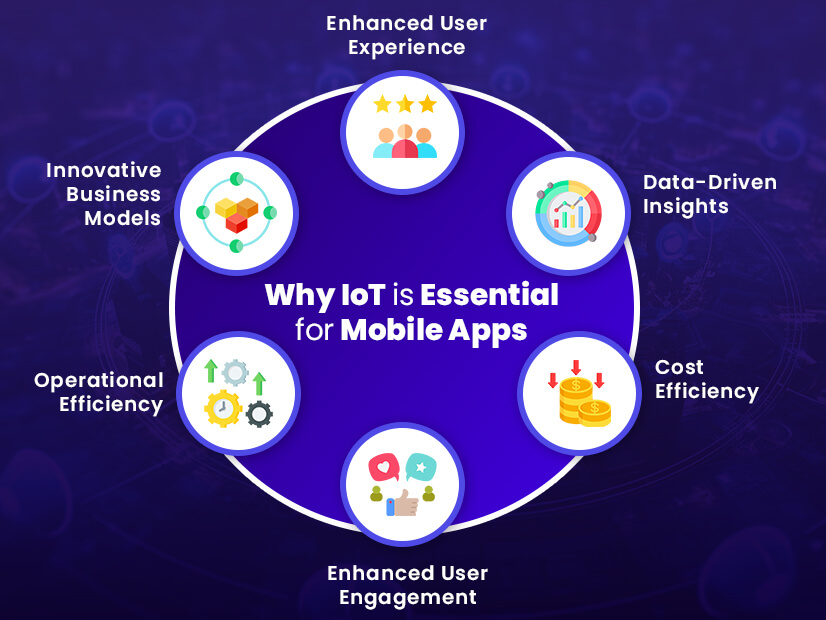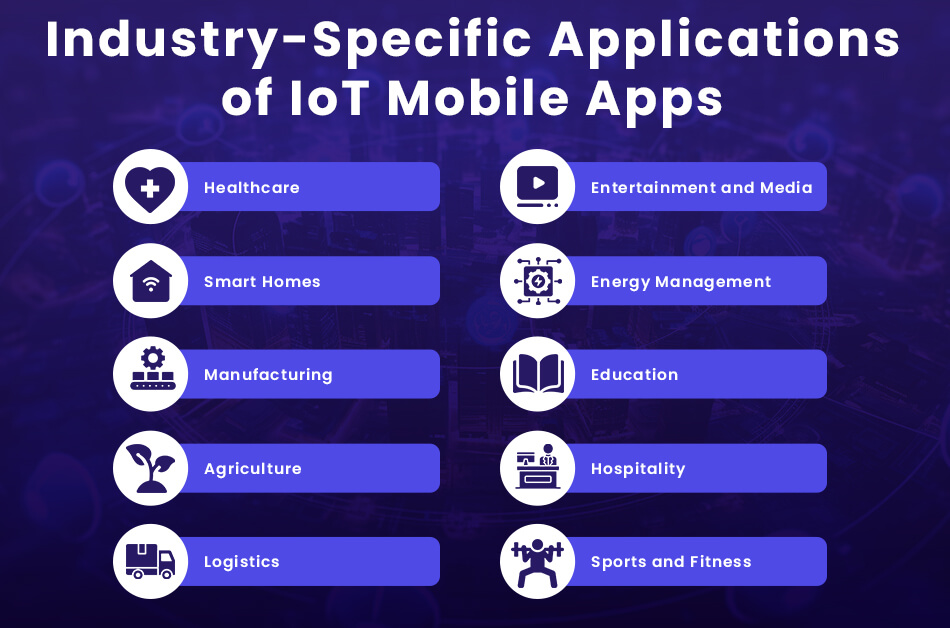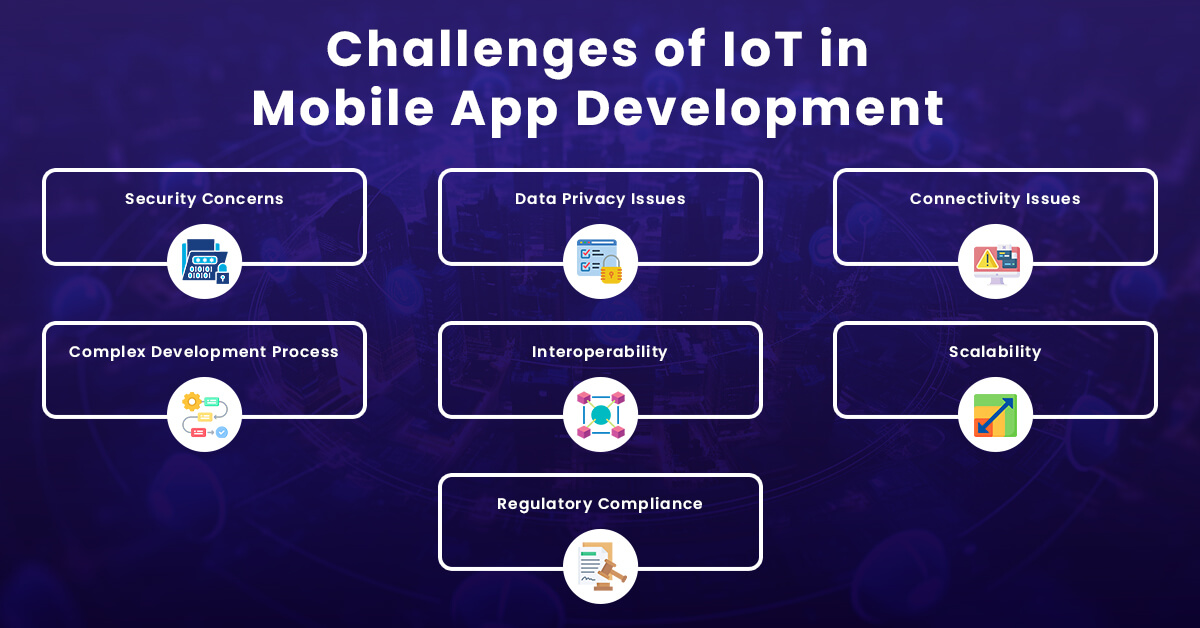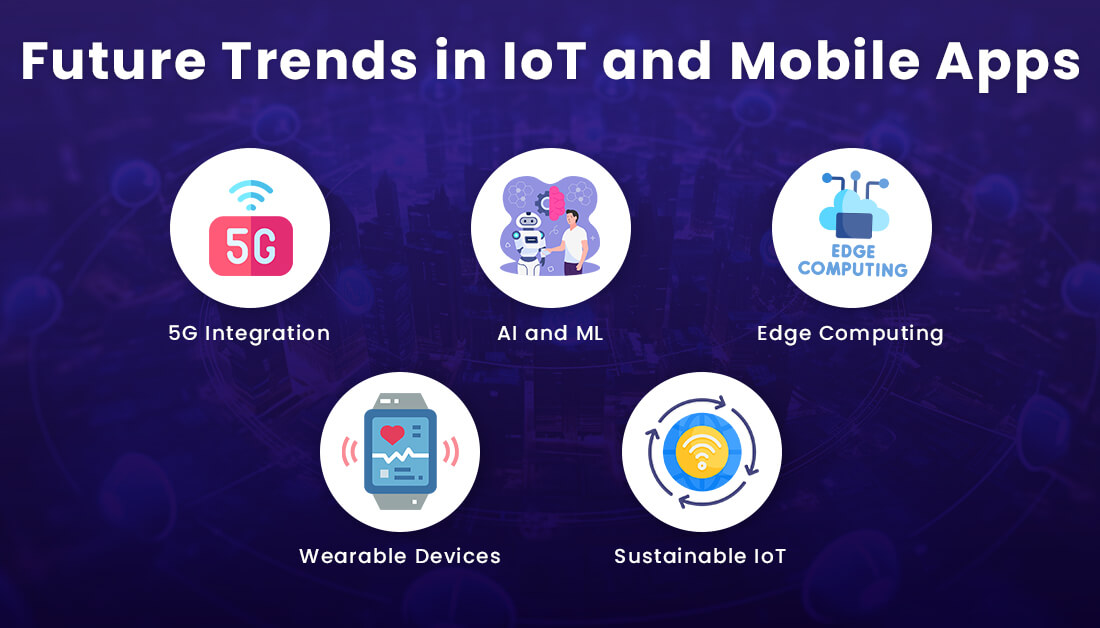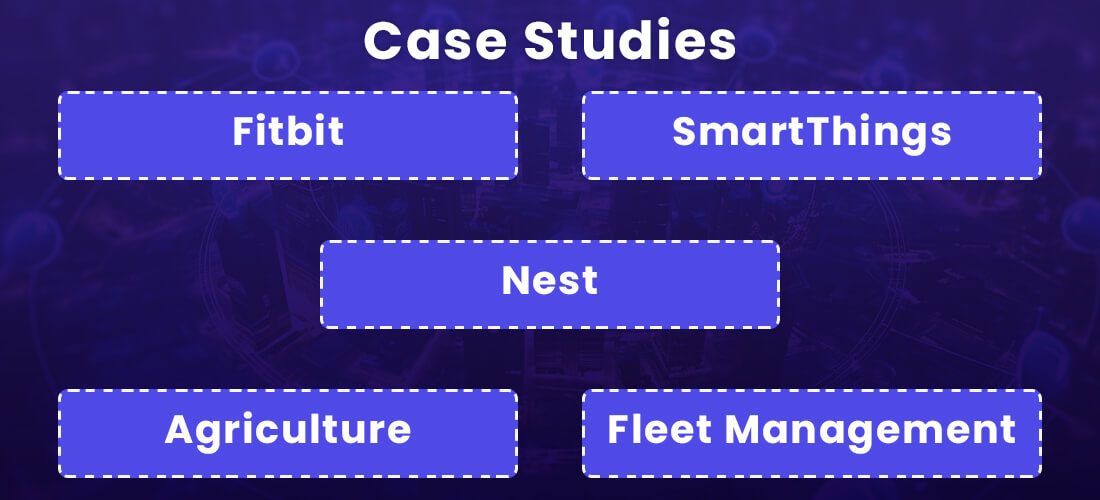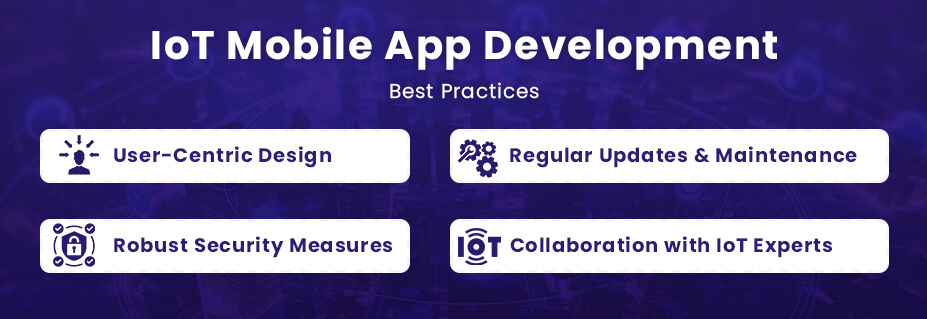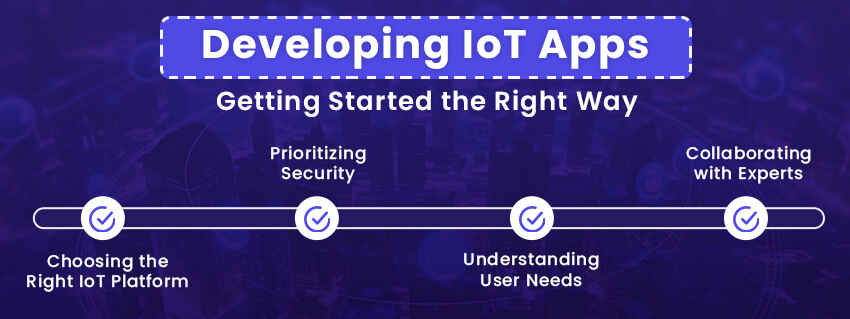
The Internet of Things (IoT) refers to the expansive network of physical devices—ranging from household appliances to industrial machinery—embedded with sensors, software, and other technologies that enable them to connect and exchange data over the internet. This interconnectedness facilitates seamless communication between devices and systems, leading to enhanced automation and efficiency across various sectors.
Mobile applications play a pivotal role in the IoT ecosystem by serving as user-friendly interfaces that allow individuals and businesses to monitor, control, and interact with their IoT devices remotely. Through these apps, users can receive real-time data insights, manage device settings, and automate tasks, thereby optimizing operations and improving overall user experience.
The integration of IoT into mobile app development has become increasingly significant. According to recent statistics, the number of connected IoT devices is expected to reach 18.8 billion by the end of 2024, marking a 13% growth from the previous year IoT Business News. This surge underscores the growing demand for mobile IoT app solutions that can effectively harness the potential of the Internet of Things.
In this blog, we will explore the definition and importance of IoT, its impact on mobile app development, the benefits and challenges of integrating IoT into mobile applications, and the future trends shaping this dynamic intersection. By delving into these topics, we aim to provide a comprehensive understanding of how IoT is revolutionizing the landscape of mobile app development.
Table of Contents
- What is IoT and Why Does It Matter?
- How IoT Influences Mobile App Development
- Key Benefits of Integrating IoT in Mobile Apps
- Industry Applications of IoT-Enabled Mobile Apps
- Healthcare: Revolutionizing Patient Care
- Smart Homes: Redefining Comfort and Convenience
- Manufacturing: Enhancing Productivity
- Agriculture: Optimizing Resource Use
- Logistics: Streamlining Supply Chains
- Entertainment and Media: Immersive Experiences
- Energy Management: Driving Sustainability
- Education: Enabling Smart Learning
- Hospitality: Elevating Guest Experiences
- Sports and Fitness: Revolutionizing Training
- Challenges of IoT in Mobile App Development
- Future Trends in IoT and Mobile Apps
- Case Studies or Real-Life Examples
- Best Practices for Developing IoT-Integrated Mobile Apps
- Tools and Platforms Mention
- How to Get Started with IoT-Integrated App Development
- Frequently Asked Questions on IoT in App Development
- What is IoT in mobile app development?
- How does IoT enhance mobile application functionality?
- What are the top IoT trends for mobile apps in 2025?
- What are the security concerns with IoT mobile apps?
- How can businesses ensure IoT app security?
- How can businesses start developing IoT-integrated mobile apps?
- What is the impact of IoT on the healthcare industry?
- How to build an IoT mobile app?
- What is the role of IoT in mobile apps?
What is IoT and Why Does It Matter?
Definition and Scope
The Internet of Things (IoT) refers to the network of interconnected devices embedded with sensors, software, and other technologies, enabling them to collect and exchange data over the internet. This ecosystem includes devices like smart thermostats, wearable fitness trackers, industrial machinery, and even connected vehicles.
Core components of IoT include:
- Devices: Physical hardware such as smartwatches, smart home appliances, or factory sensors.
- Sensors: Tools embedded in devices to gather and transmit data, like temperature, pressure, or motion sensors.
- Cloud Computing: Infrastructure that stores and processes the vast amount of data generated by IoT devices.
These components work together to enable real-time data exchange, automation, and advanced decision-making across industries.
Impact on Daily Life
The integration of IoT in mobile applications has transformed how we interact with technology, bringing unparalleled convenience and efficiency. Here are some real-world examples:
- Smart Homes: IoT-enabled devices like smart lighting systems, connected thermostats, and security cameras let users control their homes remotely via mobile apps.
- Wearables: Devices like fitness trackers monitor health metrics such as heart rate and activity levels, connecting users to real-time insights through mobile apps.
- Industrial IoT (IIoT): Factories use IoT-connected machinery to automate processes, monitor equipment performance, and ensure predictive maintenance, boosting productivity.
These examples illustrate how iot in mobile applications bridges the gap between devices and users, creating smarter, more efficient environments.
Market Trends
IoT is rapidly expanding across sectors, fueled by increasing device connectivity and the demand for automation. According to a report by IoT Analytics, the number of IoT-connected devices is expected to grow from 18.8 billion in 2024 to over 30 billion by 2030, underscoring its exponential growth potential. Additionally:
- The global IoT market is projected to reach $2.4 trillion by 2029.
- IoT-enabled smart home solutions alone are expected to account for over $130 billion in market value by 2025.
These trends highlight the growing significance of iot in mobile app development as businesses and consumers embrace IoT-enabled solutions. Investing in mobile IoT app solutions allows companies to stay ahead in this evolving technological landscape.
How IoT Influences Mobile App Development
IoT transforms mobile app development by enabling seamless connectivity, real-time data exchange, and automation. It enhances user experiences, creates new business opportunities, and revolutionizes industries while addressing challenges like compatibility and development complexity.
IoT as a Mobile App Catalyst
IoT acts as a transformative force in mobile app development, significantly expanding app functionalities. By connecting devices to the Internet, iot in mobile app development creates an ecosystem where mobile apps serve as centralized control hubs. For instance, a single app can now manage a smart home system, monitor healthcare devices, or oversee industrial machinery. This integration empowers users to control and interact with devices in real-time, opening up a world of possibilities.
Seamless Connectivity
The backbone of iot in mobile applications is seamless connectivity. IoT-enabled apps connect devices via protocols like Wi-Fi, Bluetooth, or ZigBee, ensuring real-time control and monitoring. Users can adjust a thermostat, lock doors, or even check factory equipment status remotely through mobile IoT app solutions, enhancing convenience and operational efficiency.
Customization
IoT-driven mobile apps leverage data from connected devices to offer personalized user experiences. By analyzing user behavior and preferences, these apps can suggest actions, automate routines, or adapt device settings. For example, a fitness tracker app may provide customized workout plans based on the user’s activity patterns, showcasing the power of internet of things apps.
Cross-Platform Compatibility
As IoT ecosystems grow, the demand for cross-platform compatibility becomes critical. Mobile apps must work seamlessly across multiple devices, whether it’s a smartphone, tablet, or wearable. IoT app evelopers focus on creating apps that integrate effortlessly with various IoT devices, ensuring consistency and usability regardless of the platform.
Data Collection and Analysis
IoT-enabled mobile apps collect vast amounts of real-time data from devices, enabling businesses to gain actionable insights. By integrating iot in mobile app solutions, companies can monitor user behavior, optimize device performance, and make data-driven decisions to enhance their offerings. For example, a logistics app can track delivery vehicle routes and suggest improvements to reduce fuel costs.
Enhanced User Experience
One of the most significant contributions of IoT to mobile app development is the improvement in user experience. IoT apps offer real-time updates, remote access, and predictive insights, making them more engaging and user-friendly. Whether it’s a smart fridge alerting users about food expiry or a healthcare app monitoring vitals, iot mobile app development companies are pushing the boundaries of user satisfaction.
Reduced Human Effort
Automation is a cornerstone of IoT-driven apps. These apps eliminate the need for constant human intervention by automating routine tasks. For instance, a smart irrigation app can schedule watering based on soil moisture levels, saving farmers time and effort.
Development Complexity
Despite its advantages, iot in mobile app development brings challenges. Developers must address issues like device compatibility, security, and connectivity while managing vast amounts of data. The complexity of designing IoT apps requires advanced expertise and robust testing protocols to ensure seamless functionality.
New Business Opportunities
IoT opens doors to innovative business models by enabling companies to offer subscription-based services, predictive maintenance, or enhanced analytics. For example, manufacturers can provide real-time monitoring solutions via mobile apps, creating additional revenue streams and fostering customer loyalty.
Data-Driven Decision Making
IoT-enabled apps empower businesses with data-driven insights, allowing them to make informed decisions. Mobile apps connected to IoT devices can analyze user patterns, predict trends, and suggest strategies to optimize operations. This capability is invaluable for industries like healthcare, logistics, and manufacturing.
By seamlessly integrating IoT into mobile app ecosystems, developers and businesses are creating revolutionary solutions that redefine connectivity, personalization, and automation. This section naturally incorporates keywords like iot in mobile applications, mobile IoT app solutions, and iot mobile app development company while maintaining an engaging and professional tone. Let me know if you need any refinements!
Key Benefits of Integrating IoT in Mobile Apps
Enhanced User Experience
IoT-enabled mobile apps bring a new level of convenience and personalization through automation. These apps can adjust device settings automatically based on user preferences or behaviors. For instance, iot in mobile applications like smart lighting systems can dim or brighten lights based on the time of day, creating a seamless and tailored experience for users.
Data-Driven Insights
With IoT, mobile apps collect and analyze real-time data from connected devices, providing valuable insights. Businesses can use this data to optimize their operations, understand customer behavior, and enhance product offerings. For example, iot in mobile app development enables fitness apps to provide detailed reports on health metrics, empowering users to make informed decisions about their lifestyle.
Cost Efficiency
Integrating IoT into mobile apps helps businesses and users save costs by optimizing resource usage. For example, mobile IoT app solutions in smart homes monitor energy consumption and automatically adjust heating or cooling systems based on occupancy, leading to significant savings on energy bills. Similarly, businesses benefit from reduced downtime and operational efficiency through predictive maintenance.
Enhanced User Engagement
IoT-powered apps use data from connected devices to create highly personalized interactions, keeping users engaged. For instance, a wearable device connected to a mobile app can send real-time notifications and personalized fitness recommendations, showcasing the potential of Internet of Things mobile applications to boost user loyalty.
Operational Efficiency
IoT automates and streamlines processes, making operations smoother and more efficient. Apps integrated with IoT devices in industries like logistics can optimize supply chain management by tracking shipments in real-time. By reducing manual intervention, iot app development companies enable businesses to improve productivity and minimize errors.
Innovative Business Models
IoT paves the way for new revenue streams and service models. Businesses can offer subscription-based IoT services, predictive analytics, or device-as-a-service solutions through mobile apps. For instance, a manufacturer might provide IoT-enabled monitoring services via a mobile app, creating additional value for their customers.
Industry Applications of IoT-Enabled Mobile Apps
Healthcare: Revolutionizing Patient Care
IoT-powered mobile apps are transforming healthcare by enabling remote patient monitoring and health tracking. Wearable devices connected to internet of things mobile applications allow doctors to monitor vital signs in real time, offering proactive care and reducing hospital visits. For example, IoT apps integrated with fitness trackers help patients manage chronic conditions by tracking heart rate, blood pressure, and activity levels.
Smart Homes: Redefining Comfort and Convenience
IoT-enabled apps offer seamless control of lighting, security, and appliances, making homes smarter and more energy-efficient. Users can remotely adjust temperature, lock doors, or even control home appliances through mobile IoT app solutions. Features like voice commands via Alexa or Google Home further enhance convenience, creating a connected living experience.
Manufacturing: Enhancing Productivity
In manufacturing, iot in mobile applications is used for equipment monitoring, predictive maintenance, and workflow optimization. IoT-enabled mobile apps can detect equipment malfunctions early, reducing downtime and improving productivity. For instance, factory operators can monitor machinery performance in real time, ensuring smooth operations.
Agriculture: Optimizing Resource Use
IoT in agriculture has revolutionized how farmers manage crops and resources. IoT mobile apps connected to smart sensors provide real-time data on soil moisture, weather conditions, and nutrient levels, enabling precision farming. Automated irrigation systems controlled via IoT apps ensure efficient water use, maximizing yields and reducing waste.
Logistics: Streamlining Supply Chains
IoT-enabled mobile apps play a critical role in logistics by providing real-time tracking of shipments and inventory. Businesses use iot in mobile app development to optimize routes, monitor delivery progress, and ensure efficient supply chain management. IoT sensors integrated with mobile apps also help monitor storage conditions, such as temperature and humidity, for perishable goods.
Entertainment and Media: Immersive Experiences
IoT-powered apps enhance user engagement in entertainment by connecting devices like smart TVs and gaming systems. For example, IoT-enabled apps integrate augmented reality (AR) and virtual reality (VR) features to create immersive gaming experiences. These apps act as remote controls for streaming devices, simplifying interaction and customization for users.
Energy Management: Driving Sustainability
IoT apps help businesses and households monitor and optimize energy consumption. By analyzing data from IoT sensors, these apps suggest ways to reduce power usage and costs. For instance, IoT-enabled renewables, like solar panels, connect with mobile apps to track energy generation and consumption, promoting eco-friendly practices.
Education: Enabling Smart Learning
IoT mobile apps are transforming education by creating interactive and connected learning environments. IoT-enabled systems use sensors and mobile apps to manage classroom devices, track student engagement, and offer personalized learning experiences. These innovations make education more engaging and effective.
Hospitality: Elevating Guest Experiences
In the hospitality industry, IoT-enabled mobile apps enhance guest experiences by providing features like climate control, keyless entry, and personalized room settings. Guests can control room amenities through iot mobile app development company solutions, ensuring convenience and satisfaction during their stay.
Sports and Fitness: Revolutionizing Training
IoT apps are transforming fitness and sports training by analyzing real-time performance data. Wearable devices track metrics like speed, stamina, and heart rate, providing actionable insights through mobile apps. This integration of iot in mobile applications helps athletes and fitness enthusiasts optimize their training routines.
Challenges of IoT in Mobile App Development
Security Concerns
One of the most pressing challenges in iot in mobile app development is security. With billions of connected devices, the risk of hacking and data breaches is significant. Cybercriminals can exploit vulnerabilities in IoT networks to access sensitive information or disrupt operations. To counter this, developers must implement robust security measures such as end-to-end encryption and multi-factor authentication to protect iot in mobile applications from potential threats.
Data Privacy Issues
Handling and storing sensitive user data is a major concern for iot mobile app development companies. IoT apps often collect vast amounts of personal and operational data, making privacy a critical issue. Developers must comply with data protection regulations like GDPR and implement privacy-by-design principles to ensure that user information is handled securely and transparently.
Connectivity Issues
The functionality of mobile IoT app solutions relies heavily on stable network infrastructure. Poor connectivity can lead to delays in data exchange, disrupted communication between devices, and diminished user experience. Ensuring seamless connectivity, even in areas with limited network access, remains a significant challenge for developers.
Complex Development Process
Developing iot in mobile applications requires expertise in various domains, including IoT protocols, device integration, and app development. This complexity increases the development timeline and demands skilled teams familiar with IoT ecosystems. From designing APIs to testing device compatibility, the process can be resource-intensive.
Interoperability
IoT ecosystems consist of diverse devices with varying protocols, creating challenges in ensuring seamless communication between them. IoT app development companies address this by building apps that are compatible with multiple devices and platforms, enabling users to connect and control their IoT systems effortlessly.
Scalability
As IoT ecosystems grow, apps must handle an increasing volume of connected devices and data. Designing internet of things mobile applications that can scale efficiently without compromising performance or security is a critical challenge. Developers need to build architectures capable of managing future growth in device connections and data complexity.
Regulatory Compliance
IoT app developers must navigate a complex landscape of global and regional regulations, such as data protection laws and industry-specific standards. Failing to adhere to these can result in legal and financial repercussions. Ensuring compliance while maintaining innovation is a delicate balance for developers.
Future Trends in IoT and Mobile Apps
5G Integration: Revolutionizing IoT-Enabled Apps
The integration of 5G technology is set to redefine iot in mobile app development by providing faster data transfer rates, lower latency, and enhanced network reliability. With 5G, IoT-enabled apps can process real-time data more efficiently, ensuring seamless connectivity for applications like smart homes, autonomous vehicles, and industrial IoT. For example, mobile IoT app solutions powered by 5G will enable instantaneous control of connected devices, creating more responsive and reliable ecosystems.
AI and Machine Learning: Smarter IoT Systems
Artificial Intelligence (AI) and Machine Learning (ML) are transforming internet of things applications by enabling predictive analytics and autonomous decision-making. IoT apps integrated with AI can analyze vast amounts of real-time data, identify patterns, and predict user needs. For instance, a smart thermostat app can learn a user’s habits and adjust temperature settings automatically, offering enhanced convenience and energy savings.
Edge Computing: Accelerating Data Processing
Edge computing is emerging as a game-changer in iot in mobile applications, enabling data to be processed closer to IoT devices rather than in centralized cloud servers. This reduces latency, enhances app performance, and ensures quicker responses for critical applications like healthcare monitoring and industrial automation. Mobile apps leveraging edge computing provide users with real-time insights, even in scenarios with limited internet connectivity.
Wearable Devices: Expanding the IoT Ecosystem
Wearable devices are becoming integral to the IoT ecosystem, with mobile apps serving as the primary interface for these gadgets. From fitness trackers to smartwatches, iot mobile app development companies are focusing on creating apps that deliver real-time data and actionable insights. For example, IoT apps connected to wearables can monitor health metrics, track activities, and even provide alerts for potential medical issues, enhancing user engagement and utility.
Sustainable IoT: Driving Environmentally Conscious Innovations
The future of IoT lies in sustainability, with an increasing focus on eco-friendly solutions. IoT apps are being designed to optimize resource usage, reduce energy consumption, and minimize environmental impact. For example, mobile IoT app solutions in smart grids help monitor and manage electricity usage, enabling users to adopt more sustainable practices. Businesses are also leveraging IoT for waste reduction and energy-efficient manufacturing processes.
Case Studies or Real-Life Examples
Fitbit: Transforming Personal Fitness Through IoT
Fitbit, a leader in wearable technology, exemplifies the power of iot in mobile applications. By connecting its devices to a mobile app, Fitbit enables users to monitor real-time health metrics such as heart rate, steps, and sleep patterns. The app leverages IoT to provide personalized fitness insights, set goals, and track progress, enhancing user engagement and satisfaction.
- Challenge Addressed: Simplifying health monitoring for busy individuals.
- Impact: Improved user lifestyle choices and a 35% increase in active app users over two years.
SmartThings: Redefining Smart Home Automation
Samsung’s SmartThings platform has revolutionized smart home management by offering a centralized app for controlling IoT-enabled devices. Users can manage lighting, security cameras, thermostats, and even home appliances via a single interface, showcasing the versatility of mobile IoT app solutions.
- Challenge Addressed: Providing seamless control over multiple smart home devices.
- Impact: Enhanced convenience and a 25% reduction in energy costs for users adopting smart home systems.
Nest: Energy Efficiency Made Simple
Nest, a pioneer in smart thermostats, leverages IoT to optimize home heating and cooling systems. The Nest app connects to IoT-enabled thermostats, allowing users to adjust temperatures remotely and receive energy usage insights. Its integration with machine learning enhances personalization, offering greater efficiency.
- Challenge Addressed: Reducing energy wastage in homes.
- Impact: Customers saved an average of 10-12% on heating bills and 15% on cooling bills annually.
Agriculture IoT App: Improving Farming Efficiency
An IoT-enabled mobile app developed for precision farming uses sensors to collect real-time data on soil moisture, weather, and crop health. By analyzing this data, the app provides actionable insights to farmers, enabling better resource management.
- Challenge Addressed: Optimizing crop yields while reducing water and fertilizer use.
- Impact: Farmers reported a 20% increase in crop yields and a 30% reduction in resource consumption.
Fleet Management App: Streamlining Logistics
A logistics company developed an IoT-powered mobile app to track its fleet in real time. By integrating GPS and IoT sensors, the app provides route optimization, fuel usage data, and maintenance alerts.
- Challenge Addressed: Improving operational efficiency and reducing costs.
- Impact: A 15% decrease in fuel costs and a 25% improvement in delivery timelines.
Best Practices for Developing IoT-Integrated Mobile Apps
User-Centric Design
Designing an intuitive and accessible interface is crucial for the success of iot in mobile applications. A user-centric approach ensures that users can interact effortlessly with IoT-enabled devices through mobile apps. Focus on creating seamless navigation, customizable dashboards, and visually appealing designs that cater to diverse user needs. For example, mobile IoT app solutions in healthcare should prioritize ease of use for both patients and medical professionals.
Robust Security Measures
Security is a top priority in iot in mobile app development, as these apps handle sensitive data and control critical devices. Developers should implement end-to-end encryption, multi-factor authentication, and secure data transmission protocols to safeguard against cyber threats. Building in features like biometric login or device-specific authentication further enhances security and builds user trust.
Regular Updates and Maintenance
To ensure reliability and compatibility, IoT apps require frequent updates and maintenance. Regular updates address bug fixes, enhance security, and introduce new features, keeping the app aligned with evolving technologies. IoT developers should also perform periodic testing to ensure smooth integration with newly connected devices in the IoT ecosystem.
Collaboration with IoT Experts
Developing iot mobile app development company solutions demands specialized expertise. Collaborating with IoT experts can help businesses design scalable architectures, choose the right IoT protocols, and navigate technical complexities. Expert input ensures that the app meets both user expectations and industry standards while leveraging the latest advancements in IoT.
Tools and Platforms Mention
Popular IoT Platforms
Choosing the right platform is essential for developing efficient and scalable iot in mobile app development solutions. Here are some widely used platforms:
- AWS IoT Core: A robust platform that enables secure interaction between IoT devices and cloud applications. It supports real-time data processing and seamless integration with other AWS services, making it ideal for creating scalable iot in mobile applications.
- Google Cloud IoT: Known for its advanced analytics capabilities, this platform offers tools to manage IoT devices securely. With features like Cloud IoT Core and BigQuery, it supports data-driven decision-making and enhances the development of mobile IoT app solutions.
- ThingWorx: A versatile platform designed for rapid IoT application development. It provides tools for connectivity, data analysis, and remote monitoring, making it a popular choice for industrial IoT applications.
Frameworks and Tools for Development
Building IoT-enabled apps requires specialized tools and frameworks that simplify the development process:
- IoT Mobile SDKs: These software development kits offer pre-built components for integrating IoT functionalities into mobile apps. They streamline tasks like device connectivity, data handling, and UI development.
- Testing and Debugging Tools: Ensuring the reliability of internet of things mobile applications requires robust testing tools. Solutions like Postman for API testing and Selenium for UI automation help identify and resolve issues during development.
Criteria for Choosing the Right Platform
Selecting the right IoT platform or tool depends on several critical factors:
- Scalability: The platform must accommodate the growing number of connected devices and increasing data volume without compromising performance.
- Compatibility: Ensure the platform supports multiple protocols and integrates seamlessly with existing systems and devices in the IoT ecosystem.
- Security: Prioritize platforms that offer end-to-end encryption, secure authentication, and compliance with data protection regulations to safeguard user data.
How to Get Started with IoT-Integrated App Development
Choosing the Right IoT Platform
Selecting the ideal platform is the foundation for successful iot in mobile app development. Consider platforms like AWS IoT Core, Google Cloud IoT, or ThingWorx, which offer scalability, compatibility, and advanced analytics. Look for solutions that support seamless integration with existing devices and protocols, ensuring the platform can handle future growth in the IoT ecosystem.
Prioritizing Security
Robust security measures are essential for developing iot in mobile applications that users can trust. Implement end-to-end encryption, multi-factor authentication, and secure data transmission protocols. Ensure compliance with global security standards and data protection regulations, such as GDPR, to safeguard sensitive information.
Understanding User Needs
Creating mobile IoT app solutions requires a user-centric approach. Focus on understanding your target audience’s pain points and needs. For example:
- Design intuitive interfaces for easy navigation.
- Enable seamless connectivity for real-time control of IoT devices.
- Incorporate customizable features to enhance personalization.
By addressing user needs, your app can deliver a better experience and increase user engagement.
Collaborating with Experts
Developing Internet of things mobile apps demands specialized knowledge in IoT protocols, device integration, and app design. Partnering with IoT-focused development teams ensures your app is built on a solid foundation, leveraging the latest technologies and best practices. Experts can help streamline the development process, mitigate technical challenges, and optimize app performance.
Conclusion
The integration of IoT in mobile app development is revolutionizing the way businesses and users interact with technology. By enabling seamless connectivity, real-time data exchange, and automation, IoT has opened new avenues for innovation across industries. From healthcare to agriculture, and smart homes to logistics, internet of things mobile applications are delivering unparalleled efficiency, personalization, and user engagement.
To stay competitive in this rapidly evolving landscape, businesses must embrace the opportunities offered by IoT. By leveraging mobile IoT app solutions, organizations can optimize operations, enhance user experiences, and unlock new revenue streams. Partnering with an experienced mobile app development company can ensure that your solutions are secure, scalable, and tailored to your unique needs.
The future of app development lies in IoT integration, and the time to act is now. Explore the potential of iot in mobile applications to transform your business and deliver value-driven solutions for your users. Let’s build the next generation of innovative mobile apps together!
Frequently Asked Questions on IoT in App Development
What is IoT in mobile app development?
IoT in mobile app development refers to the integration of IoT devices and mobile applications to enable seamless connectivity, data exchange, and real-time control. These apps act as a bridge between users and IoT devices, allowing them to monitor, control, and automate processes.
How does IoT enhance mobile application functionality?
IoT enhances mobile application functionality by enabling real-time data collection, seamless connectivity, and automation. Features like remote control of devices, personalized user experiences, and predictive analytics are powered by IoT, making apps more dynamic and efficient.
What are the top IoT trends for mobile apps in 2025?
Some of the top IoT trends for mobile apps in 2025 include:
- 5G integration for faster and more reliable connectivity.
- Edge computing to reduce latency and improve performance.
- AI-powered IoT for predictive analytics and smarter device interactions.
- Growth in wearable devices and IoT-enabled healthcare solutions.
- Increased focus on sustainable IoT innovations.
What are the security concerns with IoT mobile apps?
Security concerns with IoT mobile apps include risks of hacking, data breaches, and unauthorized device access. Vulnerabilities in IoT networks can expose sensitive user data and disrupt device functionality, making security a top priority for developers.
How can businesses ensure IoT app security?
To ensure IoT app security, businesses should:
- Implement end-to-end encryption for secure data transmission.
- Use multi-factor authentication and biometric verification.
- Regularly update apps to address vulnerabilities.
- Comply with data protection regulations such as GDPR.
- Conduct thorough security testing during development.
How can businesses start developing IoT-integrated mobile apps?
Businesses can start by:
- Choosing the right IoT platform that aligns with their goals.
- Defining user needs to create a focused and user-friendly design.
- Partnering with an experienced IoT mobile app development company.
- Ensuring robust security measures and scalable architecture.
What is the impact of IoT on the healthcare industry?
IoT has transformed healthcare by enabling remote patient monitoring, smart medical devices, and real-time health tracking. IoT-powered mobile IoT app solutions improve patient outcomes, reduce hospital visits, and empower healthcare providers with actionable insights.
How to build an IoT mobile app?
To build an IoT mobile app:
- Identify your target audience and their needs.
- Choose a compatible IoT platform and development framework.
- Focus on creating an intuitive, user-friendly interface.
- Integrate secure protocols for data transmission and device connectivity.
- Partner with IoT experts for development and testing.
What is the role of IoT in mobile apps?
The role of IoT in mobile apps is to facilitate connectivity between devices and users, enabling control, automation, and data-driven insights. IoT transforms mobile apps into powerful tools for monitoring and managing IoT ecosystems across industries.
Rebecca Harrison combines her love for emerging technologies with her ability to explain them in clear, concise terms. With expertise in blockchain, IoT, cloud computing, big data, and cryptocurrency, Rebecca’s articles are essential reads for tech-savvy audiences. She has worked closely with tech startups and established companies to explore the potential of these transformative technologies.
